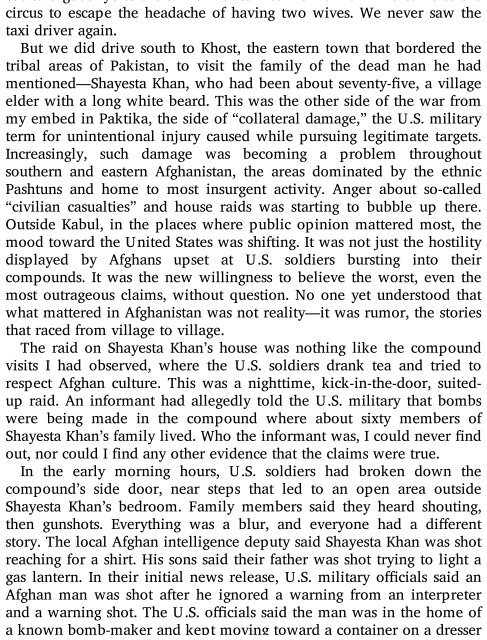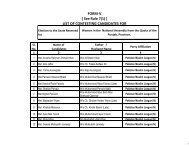the_taliban_shuffle_-_kim_barker
the_taliban_shuffle_-_kim_barker
the_taliban_shuffle_-_kim_barker
Create successful ePaper yourself
Turn your PDF publications into a flip-book with our unique Google optimized e-Paper software.
We said goodbye to <strong>the</strong> taxi driver to interview a man who came to <strong>the</strong><br />
circus to escape <strong>the</strong> headache of having two wives. We never saw <strong>the</strong><br />
taxi driver again.<br />
But we did drive south to Khost, <strong>the</strong> eastern town that bordered <strong>the</strong><br />
tribal areas of Pakistan, to visit <strong>the</strong> family of <strong>the</strong> dead man he had<br />
mentioned—Shayesta Khan, who had been about seventy-ve, a village<br />
elder with a long white beard. This was <strong>the</strong> o<strong>the</strong>r side of <strong>the</strong> war from<br />
my embed in Paktika, <strong>the</strong> side of “collateral damage,” <strong>the</strong> U.S. military<br />
term for unintentional injury caused while pursuing legitimate targets.<br />
Increasingly, such damage was becoming a problem throughout<br />
sou<strong>the</strong>rn and eastern Afghanistan, <strong>the</strong> areas dominated by <strong>the</strong> ethnic<br />
Pashtuns and home to most insurgent activity. Anger about so-called<br />
“civilian casualties” and house raids was starting to bubble up <strong>the</strong>re.<br />
Outside Kabul, in <strong>the</strong> places where public opinion mattered most, <strong>the</strong><br />
mood toward <strong>the</strong> United States was shifting. It was not just <strong>the</strong> hostility<br />
displayed by Afghans upset at U.S. soldiers bursting into <strong>the</strong>ir<br />
compounds. It was <strong>the</strong> new willingness to believe <strong>the</strong> worst, even <strong>the</strong><br />
most outrageous claims, without question. No one yet understood that<br />
what mattered in Afghanistan was not reality—it was rumor, <strong>the</strong> stories<br />
that raced from village to village.<br />
The raid on Shayesta Khan’s house was nothing like <strong>the</strong> compound<br />
visits I had observed, where <strong>the</strong> U.S. soldiers drank tea and tried to<br />
respect Afghan culture. This was a nighttime, kick-in-<strong>the</strong>-door, suitedup<br />
raid. An informant had allegedly told <strong>the</strong> U.S. military that bombs<br />
were being made in <strong>the</strong> compound where about sixty members of<br />
Shayesta Khan’s family lived. Who <strong>the</strong> informant was, I could never nd<br />
out, nor could I find any o<strong>the</strong>r evidence that <strong>the</strong> claims were true.<br />
In <strong>the</strong> early morning hours, U.S. soldiers had broken down <strong>the</strong><br />
compound’s side door, near steps that led to an open area outside<br />
Shayesta Khan’s bedroom. Family members said <strong>the</strong>y heard shouting,<br />
<strong>the</strong>n gunshots. Everything was a blur, and everyone had a dierent<br />
story. The local Afghan intelligence deputy said Shayesta Khan was shot<br />
reaching for a shirt. His sons said <strong>the</strong>ir fa<strong>the</strong>r was shot trying to light a<br />
gas lantern. In <strong>the</strong>ir initial news release, U.S. military ocials said an<br />
Afghan man was shot after he ignored a warning from an interpreter<br />
and a warning shot. The U.S. ocials said <strong>the</strong> man was in <strong>the</strong> home of<br />
a known bomb-maker and kept moving toward a container on a dresser



